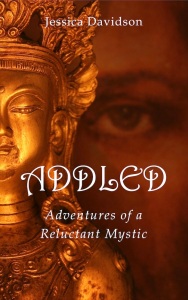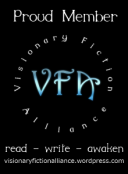Visionary Fiction became a recognised fiction genre around the turn of the millennium, but stories using visionary elements have always existed. In fact, Visionary Fiction (VF) might be the oldest genre of storytelling.
 I first heard of VF when I was trying to decide which genre my debut novel fell into. Addled: Adventures of a Reluctant Mystic is the story of one woman’s quest for self-realisation, and although the story uses Zen philosophy, the Spiritual Fiction category didn’t seem to fit. I didn’t want to label it as Literary Fiction because that wasn’t right either. It does contain elements that could be classed as magic realism, so did it fit the Fantasy or Speculative Fiction genres? No, again. I looked at similar novels by authors like Paulo Coelho and Anne Cushman, but they seemed to be classified under standard genres like Contemporary Fiction or even Non-Fiction. And then I found Visionary Fiction.
I first heard of VF when I was trying to decide which genre my debut novel fell into. Addled: Adventures of a Reluctant Mystic is the story of one woman’s quest for self-realisation, and although the story uses Zen philosophy, the Spiritual Fiction category didn’t seem to fit. I didn’t want to label it as Literary Fiction because that wasn’t right either. It does contain elements that could be classed as magic realism, so did it fit the Fantasy or Speculative Fiction genres? No, again. I looked at similar novels by authors like Paulo Coelho and Anne Cushman, but they seemed to be classified under standard genres like Contemporary Fiction or even Non-Fiction. And then I found Visionary Fiction.
What is Visionary Fiction?
In a nutshell, VF is about growth of consciousness and the expansion of the human mind. It embraces spiritual and esoteric wisdom, and shows the limitless potential we have for transformation and evolution.
“What separates VF from other speculative fiction is intention. Besides telling a good story, VF enlightens and encourages readers to expand their awareness of greater possibilities.” – Margaret Duarte
Jung made a distinction between two types of art form: psychological and visionary. Psychological art is what we would call mainstream or realism, while visionary art is anything that takes us out of the familiar world:
“It is a strange something that derives its existence from the hinterlands of man’s mind – that suggests the abyss of time separating us from pre-human ages, or evokes a superhuman world of contrasting light and darkness.” – Jung, Modern Man in Search of a Soul.
The Visionary Fiction Alliance describes three main characteristic features of the genre:
- growth of consciousness is the central theme of the story and drives the main character(s);
- it uses paranormal elements such as ESP, dreams, visions and other metaphysical plot devices;
- it is universal in its worldview and scope.
The spiritual elements of VF are often embedded into the story so that the reader experiences the truth of the wisdom, rather than just reading about it. Spiritual teachers have always done this, illustrating their wisdom with parables and metaphors. This is good basic storytelling and follows the number one cardinal rule: show, don’t tell. The reader then shares the transformative experience of the character(s).
All the best fiction does this: it encourages the reader to ‘feel with’ the character(s) and experience their journey from the inside. The difference with VF is that the journey is explicitly about growth in consciousness. The main arc or driver of the plot is Self-actualisation or Individuation.
In fact, you could argue that the earliest stories told covered exactly that theme. Ancient mythologies and legends can be understood as metaphors for the transformation of the human mind: the hero undertakes a journey away from the tribe, encounters trials and learns new skills, and then returns transformed to share his wisdom. This basic plot structure, identified by Joseph Campbell in The Hero with a Thousand Faces, is the basis for much of the storytelling seen in films and on TV today.

Is VF really a genre?
Since VF is an emerging genre, there’s still a lot of debate about exactly what it is and where it fits in the marketplace. Many genres contain visionary elements and VF often overlaps with these causing more confusion. There are many blurred lines, as I discovered when trying to fit Addled into a neat little box. Other genres that are often linked with VF include: Speculative Fiction and Fantasy, Sci-Fi, Spiritual Fiction, Metaphysical Fiction, and in literary circles, Magic Realism.
Mainstream publishers seem wary of taking a risk on anything seen as overtly VF because it’s hard to categorise, so a lot of the books end up being self-published.
But an even bigger problem is cynicism. Many see VF as too spiritual and don’t want to read these kinds of stories because they think they’ll be ‘preached at’. Nobody enjoys being evangelised, but there’s an innate cynicism that seems to characterise our current age. We believe we’re rational and have outgrown such stories. It’s almost as if we’re scared of anything too ‘meaningful’, or perhaps we don’t want to be challenged to change ourselves too much. Stories are there to be consumed as entertainment. They might make us think – a bit – but not for long, and certainly not in a way that would undermine our cosy lives.
“The reading public for the most part repudiates this kind of writing – unless indeed it is coarsely sensational – and even the literary critic seems embarrassed by it.”
Jung
VF isn’t the only genre to cause embarrassment. Even Speculative Fiction and Fantasy still suffer from literary snobbery. In fact, all genre novels do, despite the popularity of TV and film adaptations such as Lord of the Rings and Game of Thrones. I don’t want to get into the whole ‘it’s not real writing unless it’s literary’ debate here, but it does raise an important point about one of the problems with VF.
Perhaps one of the reasons publishers struggle to take VF seriously is because much of it has been of inferior quality. Although millions have bought books like The Celestine Prophecy by James Redfield, it couldn’t be described as good writing. The characters are one-dimensional and the plot is driven by coincidence and contrivance. There’s plenty of mainstream fiction that suffers from similar problems, but there’s no reason VF couldn’t include quality works. Perhaps it will mature as more writers embrace the genre and explore the possibilities it contains.
These are some of my favourite VF novels, all of them expertly written and at least one is a classic:
- Siddhartha by Hermann Hesse
- Chocolat by Joanne Harris
- Life of Pi by Yann Martel
- Life After Life by Kate Atkinson
 To celebrate the launch of Addled in paperback, I’ve joined the Visionary Fiction Alliance. You can find out more about their work and the VF genre here.
To celebrate the launch of Addled in paperback, I’ve joined the Visionary Fiction Alliance. You can find out more about their work and the VF genre here.


I agree with the Celestine Prophesy – the writing is pretty awful, unfortunately! But I appreciate some of the ideas in the book. Will check out the recs that I haven’t read – I love Siddhartha too. I guess The Alchemist fits into the category too..?
LikeLiked by 1 person
Yes, The Alchemist is definitely Visionary Fiction – but I didn’t enjoy that one either.
LikeLiked by 1 person
I detest and refuse to read fiction that tells instead of showing, uses round characters and natural plots; consequently, I cannot be deterred by any of your propaganda from telling massively and shamelessly instead of showing, and from writing all characters as flkat strawmen and author inserts.
LikeLike
Thank you for a very useful post, about a genre I’d never heard of 🙂
LikeLike
Glad you liked it, Julie 🙂
LikeLiked by 1 person
Nice summary of our special Visionary Fiction genre! Welcome to our VF writing tribe, it’s good to meet you!
LikeLiked by 2 people
Thanks Jodine. It’s good to meet you too 🙂
LikeLiked by 1 person
Welcome to the Visionary Fiction Alliance, Jessica. Here’s wishing you the best with the launch of ADDLED.
LikeLiked by 1 person
Thanks Margaret 🙂
LikeLike